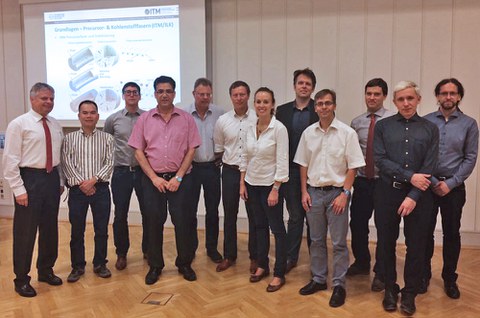Jun 28, 2017
Excellent research in Saxony: Symbiosis of the high-tech fields of "lightweight engineering with carbon" and "energy storage"

Kick-off meeting of the junior research group "e-Carbon". The aim is to research tailor-made carbon fibres for energy storage.
Against the background of global megatrends such as the depletion of natural resources and an increasingly individualized way of life, energy storage and lightweight engineering are key technologies in the field of innovative mobility concepts. The sustainable use of new materials with a high functional density that meet requirements and for which carbon fibres have enormous potential is of particular importance in the development of new high-tech products in these sectors at the Saxony location.
Scientists at TU Dresden (TUD) have succeeded in establishing an interdisciplinary junior research group "e-Carbon" (ESF-SAB 100310387), consisting of chemists, textile and polymer engineers, which will jointly develop tailored and multifunctional carbon fibers for the storage of high energy densities over the next three years, starting July 1, 2017. This forward-looking project was selected by the TU Dresden and the Sächsische Aufbaubank SAB-ESF from more than 40 applications as a future-oriented project.
The complex topic is dealt with by young scientists of the TUD from the Institute of Textile Machinery and High Performance Textile Materials Technology (ITM), the Institute of Lightweight Engineering and Polymer Technology (ILK) and the Chair of Anorganic Chemistry I (AC1). The interdisciplinary orientation of the consortium creates the best conditions with a worldwide unique position for intensive scientific and industrial networking of young researchers in new fields of research with high practical relevance on a regional, national and international level. The main focus is on the qualification and further training of specialists for the Saxon labour market as well as on the spin-off of start-ups and the assumption of entrepreneurial responsibility in the high-tech sector.
Professor Chokri Cherif, coordinator of the junior research group and director of the ITM: "The work of the junior research group provides the initial impetus for further basic and application-oriented research in the field of carbon fibres. We will set a new standard in carbon fibre development and give special impulses worldwide".
The required equipment and technologies along the entire development chain have already been installed at the three institutes of the TU Dresden. In 2016, the Research Center Carbon Fibers Saxony (RCCF), was founded by ITM and ILK in order to combine the unique competencies in the field of development, research and production of carbon fibres at the lightweight engineering location Dresden. Thus, a complete stabilization and carbonization line is already available for "e-Carbon" in order to develop the novel functionalized carbon fibres.
With the new carbon fibres, not only can stiffness and strength be significantly increased, but the structure can also be specifically adjusted for further functions. With their large inner surface, which is not yet accessible, the carbon fibres offer enormous potential for energy storage systems, which will be the focus of the junior research group in the future. This is mainly made possible by a cross-scale, interconnecting pore system, i.e. by means of continuously cross-linked cavities of defined size in the fibers. An important advantage of extended energy storage is that the mechanical properties of the conventional carbon fibres are not impaired and the carbon fibres act both as active material and current conductor.
"The tailoring of carbon fibres and the hybridisation of materials on the microscale will open up significantly higher battery capacities than before and enable completely new construction methods for electromobility from the micro to the macro scale," explains Professor Hubert Jäger from the Institute for Lightweight Engineering and Polymer Technology (ILK). "Customized carbon fibres mean precise material properties and are a prerequisite for highly resilient and energy-rich battery concepts with high lightweight design potential. This will be our contribution to the development of innovative electromobility systems."
Within different research focuses of the junior research group, energy storage systems based on lithium-sulphur batteries with high energy density will be applied and, in the future, concepts for the transfer of the knowledge gained in the field of flexible double-layer capacitors with fast energy storage will be developed. The results of the junior research group will be used to achieve an industrial breakthrough in battery technology and electromobility. Professor Stefan Kaskel emphasizes once again: "The integration of electrical storage elements in components will open up new markets for carbon materials. It represents an important step towards the establishment of decentralized energy storage systems.“
